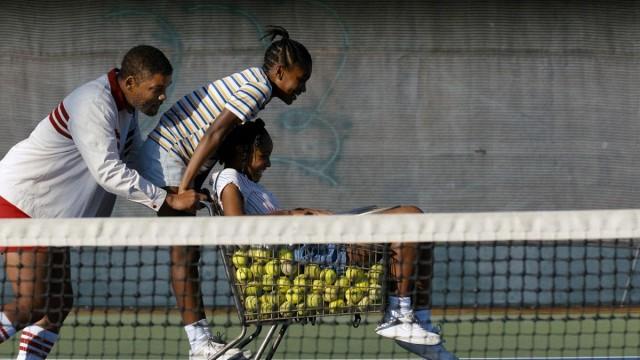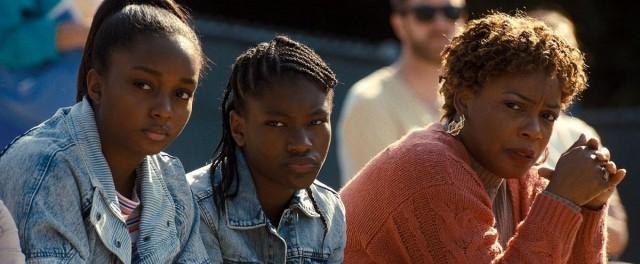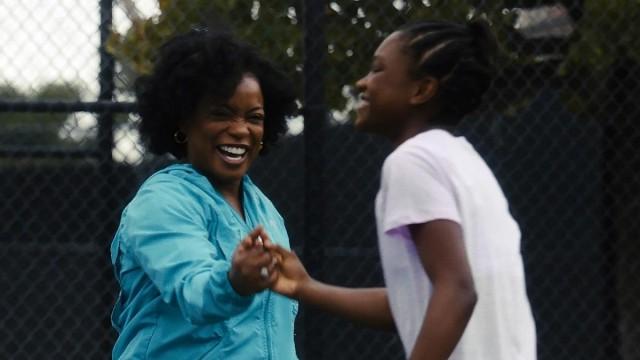Will Smith and Aunjanue Ellis on doing the story of Serena, Venus, and 'King Richard'

LOS ANGELES — For someone who grew up in a family of six siblings and was raised by an ambitious and strict Filipino-Spanish father who expected nothing but excellence from his six children, I easily related to the movie, "King Richard."
Starring actor-producer Will Smith as Richard Williams, the determined father and coach of tennis champions Venus (portrayed by Saniyya Sidney) and Serena Williams (Demi Singleton), the movie does not only talk of the driving force in the successes of the Williams sisters, who were also the executive producers of the film, but also the stresses and challenges that the Compton family had to go through to make their patriarch's dreams come true.
Williams, who also worked as a security guard, already had a brazen 78-page plan and clear vision for the success of his two daughters even before they were born. His wife, Oracene "Brandy" Price Williams (portrayed by Aunjanue Ellis), who also worked as a nurse, also helped train Serena when only Venus got a professional coach.
And of course, we all know how Venus went on to win Wimbledon five times and became the first African American woman to be ranked number one in the world during the Open Era and how Serena became a 23-time Grand Slam champion.
Below are excerpts of a discussion with 79th Golden Globe nominees Will Smith and Aunjanue Ellis following a screening of the movie at the Directors Guild of America in West Hollywood.
Will Smith

You are also the producer in this film. Why the story of Venus and Serena and their family at this point in your career? Why did you choose this project for yourself?
First of all, Zach Baylin wrote an incredible screenplay. Literally right from the top, I was excited.
Probably about 20 years ago, there was an interview that we depicted in the film. The one when Richard interrupts the interviewer and said, "You are dealing with the image of a 14-year-old child and she's going be playing tennis but your old a**, with me, is the grave!" I remember I saw that in real time. I remember the look on Venus' face. It was almost a smirk. Richard had been so vilified and so villainized in the world. When I saw that, I wasn't looking at Richard, I wasn't looking at the interview. I was looking at Venus. The look was that she had a lion that was going to protect her. That lion would kill and maim and destroy anything or anybody that tried to hurt her. It gave her this sense of confidence.
I remember at the time thinking, that's how I want my kids to look when I show up. I already had respect for Richard, and I could see there was something different that was happening than what was the public imagery. I was really excited to have the possibility to dive into, what the heck was going on, in that house? What was going on in that marriage? What was going on in that family to produce the number one and number two greatest players ever? That's bizarre. That's like the peak of Michael Jordan and winning his championships. Michael Jordan is playing against his brother, Miguel in Los Angeles. Number one and number two. It's that level. Tiger Woods and his brother, number one, and number two. It's impossible. I was excited to explore that.
How did you work with director Reinaldo Marcus Green to get to the place where you could bring this character to life?
For me, what was really great with Rei was that he was on the edge of being a professional baseball player. His father had worked with him through the similar type of teenager into the early twenties with baseball. Rei had specific opinions and now he has his own children.
My father was military. My father was a very, very firm disciplinarian. Then I had my own children. Rei and I connected on the pros and cons of different parenting approaches. We were both very familiar with the things that we had felt were unsuccessful with us as children. Then the things that we were attempting to try as parents. We were very focused and attentive.
We did interviews with Venus. We discovered with Richard what Venus called "the Jedi mind trick." We thought it was the image that he was forcing them to play tennis. That's the standard picture we have of a driving parent pushing their child. Venus said, "no, he did something different. He tricked us into begging him to let us play tennis."
As far as Richard and Oracene were concerned, tennis was almost fifth on the list of what this family was doing. God, faith, family, contribution to the human family, education. All of those things had to be in order before they were allowed to play tennis. While this family was devoted to tennis, they were devoted to one another and to being a functioning, contributing family to the world. They were making great humans. That was above everything. They were really using tennis as the target that they were working on in order to achieve the goal of just building powerful humans.
Venus said it used to be their punishment was that they couldn't play tennis. When they got in trouble, they couldn't play tennis. Serena would take socks, rubber bands and would be hitting against the wall in her room. So, that was really the magic of what Richard and Oracene were able to do. They weren't demanding. They were aligning with their children's desires. They were working together with what their children wanted and what their family wanted. It was a very unique environment.
Rei understands people and that's what's really good. Some directors love images, some directors love movement. Rei loves people. Rei loves actors. Rei loves emotion. So, it's a very different thing. What a director's paying attention to is a big part of what you experience in the theater.

Can you talk about working with Sanniya Sidney and Demi Singleton? I heard Saniyya did not play tennis before.
Neither of them played tennis. They both learned for the film and now they're number three and four. Here's the most amazing thing that impressed me with Saniyya and her work ethic. So not only did she have to learn how to play like Venus Williams, one of the greatest tennis players of all time, Saniyya is lefthanded. She had to learn with her off hand. And I was like, "That is amazing." Because I can imagine me having to throw, right? If I had to use my off hand, that would be a mess, and she learned how to play like that, what you saw, with her off hand. It was amazing to watch.
They created that family energy at all times. What you saw is how they were interacting, and it wasn't just young people having fun. They understood, as actors, that that would bleed into the screen. So, they were really sharp with being together, united, and joyful in that way as sisters. So, when the camera was rolling, it wasn't a big transition. They were really smart like that.
Can you talk about that pivotal scene in the kitchen and how you got to that place where this scene has a big explosion and Aunjanue throws down the gauntlet and destroys Will Smith on screen?
We really heated up that day. As an actor, it's such a beautiful thing when you get in there. We didn't have it at the start of the day. We were trying to find it, so we were just in there letting it rip. As an actor in my position, I've been doing it for a whole lot of years. It is so powerful to get on my heels in a scene. Aunjanue was not playing. Those shifts, those turns, and moves, and when someone's alive, it forces you to step up. So, it was a beautiful, beautiful dance that day.
Then we got shut down for almost three months for the pandemic. So, everybody had to maintain their characters over that time. Saniyya and Demi came back probably an inch and a half taller. But for Aunjanue and I, that time to let the characters marinate, when we came back, it was much more lived in. Even the reunion of it felt very family. When we were finally allowed to be back on the set, it turned out to be a real plus for us, in terms of knowing our characters and our performances.
Are you good at tennis?
I tried to take the tennis lessons, and I wanted less. I wanted to be authentic. I wanted it to be from someone who knew Richard and all of that. So, we found a guy, and we took lessons for about 15 minutes, and I was, "Teach me." He stops, and he says, "Listen. Can I be honest with you? Richard didn't know how to play tennis. Everything Richard did is supposed to be wrong. He would drop the ball and bounce it for the girls. Nobody would do that. So, I have to teach you the wrong way to do the things that Richard did. Richard understood it, but he actually couldn't play tennis."
It made it that much more amazing for me that he understood it intellectually, and he studied it, but he wasn't actually a tennis player.
What is the message you want people to take away from your experience on this film? How will you carry this experience with you moving forward?
The power of family and how delicate dreams are and the importance of who you surround yourself with. A dream, before it is realized, it's like a match in the wind. It's so important to get your team to get around it and protect the flame until you can get it going. Just one-off comment at the wrong time, can shut you down for a month.
It is so important when you have a dream, and you have something you want to build and something you want to birth into the world, who you choose to share it with, and who you choose to surround yourself with, is everything. There's going to be days when you are down, and you want to quit, and you just want to end it.
With this family, they were each other's dream insulation. It's so important who you choose to share your dreams with, and who is next to you when you fall. When you fall, and you want to quit on the road, does the person say, "See, I told you. You are stupid for moving to LA"? Or do they help you and pick you up? And they say, "Nope, you're not quitting today. You can quit when I'm not here, but you are getting up, and you are going to keep on walking today." That was one of the critical things with this family.
How important was it to show the flaws and limitations of Richard?
The most interesting for me with Richard is I didn't want to clean it up. Richard was a hard man to interact with and he was deeply flawed. He had really great qualities. I would say anybody, if you go to your Instagram, Serena posted a video a couple of hours ago of Richard with his granddaughter. It is a very rare image because he doesn't want to be on camera or anything. He's teaching her how to ride a bike and it says everything.
It says everything. You'll know everything you need to know about the beauty of his heart. She's riding a bike and it's like the best thing that ever happened in life to him. He doesn't have shoes on and he's filming her. As she goes by, he says, "You go on girl, you are the best!"
He's so engaged. That's the part that was the beautiful part of Richard Williams. But he has been so battered and brutalized by this world outside of his family. He is unwilling to let others in. He's complete and totally unwilling to risk being hurt by anybody other than his family. This world has essentially lost Richard Williams in that way. It creates an interesting dichotomy that I hope I was able to portray on camera.
What was the funniest thing that happened on the set while making this film?
The girls loved the fart day. We got that story from Venus and Serena. They were on set that day and they were telling us that Richard would do that in meetings as soon as somebody said something that he didn't like. They were on set that day. If you give me a license to fart, it's like... I had a lot of fun that day. The girls really enjoyed that.
Do you think the girls were destined to be great because it was from a higher power?
Miss Oracene was really the center of faith. That was one of the first questions we asked her. It was like, "Richard comes and he writes a plan for two kids that you all don't even have yet. He comes with this prophecy." Miss Oracene said that the plan wasn't crazy to her because she answers to someone higher than Richard Williams. She took it as a prophecy that wasn't coming from Richard, that it was coming from above. She knew what her role in that was. We asked her, "Did you ever doubt?" She said, "There was no doubt and there was no fear because as far as I'm concerned, those are the opposite of God." Yes, absolutely.
Aunjanue Ellis

The movie is about a father raising these kids, but also about a woman asserting herself and saying, "I am just as equally a part of this story as anyone else." Can you talk about your approach to her and how you executed it?
I wanted to tell the truth about Ms. Oracene Price. They did this epic interviews of Ms. Price, Zach Baylin. Our wonderful director, Reinaldo Marcus Green. They did these wonderful epic interviews of her. The great thing about that is I got the opportunity to listen to Ms. Oracene tell her own story. The truth of that, that came out of that, was that she was a co-conspirator in this crazy, maniacal dream that they had. Thankfully, I was working with filmmakers like Will, Zach, and Rei. Isha Price, her daughter, who was on set with us every day, was insisting that we do not do the trophy wife that we've seen a thousand times where you have a heroic man, and the woman does not have a say. We all wanted to tell the truth because we wanted to give Ms. Oracene her flowers, her voice.
Please talk about working with director Reinaldo Marcus Green and how you worked with him to get to the place where you could bring your character to life?
Regarding Rei, he's one of the most enthusiastic directors that I've ever worked with. He had the same energy in January of 2020 that he had our last day in December of 2020. He was a walking cheerleader for us, and he just gave us the space to play, which I love. But then he would come in with just the right word to say to give us something that gave shape. He's a genius in that way.
Talk about working with the two girls—Saniyya Sidney and Demi Singleton.
What was remarkable was what you saw on screen was a true representation of who these young women were off screen. They fell in love with each other. Sometimes, Rei would just let the camera roll and they would know that the cameras were rolling, and some of that you saw in the movie. Yes, I think we are safe in our future because of Demi Singleton and Saniyya Sidney. I also cannot say enough about how poised these young women are, how gracious they are, how intelligent they are.
They're intelligent actors and I learn from them every day. Then we also had Mikayla LaShae Bartholomew (portrayed Tunde Price), Layla Crawford (Lyndrea Price) and Daniele Lawson (Isha Price) who played the other sisters. We had a gift in those young women, right?
Please talk about the pivotal scene in the kitchen with Will Smith.
I'll just say, really quick, we didn't rehearse that. We just both worked to make sure that the words felt right. Will said something the other day that I think was great, is that he had lived with Richard for a while. I had lived with Oracene for a while. So, we were very lived in in our positions, and we came in ready to defend those positions.
What is the message you want people to take away from your experience on this film? How will you carry this experience with you moving forward?
I am such a huge fan of Venus and Serena. They are younger than I am, but they're heroines of my life for how they have presented black womanhood. Womanhood on and off the courts. They were part of a family that were equal partners in making that dream come alive. The Williams family, love was their weapon in a world that tried to destroy them. You can clap for that. I know that that is something that black families have, but that's something that we rarely see. So, I'm so excited that we see that. We see a black family loving each other. An extraordinary way, but it's not rare. I'm excited about black folks showing love for each other onscreen.
—MGP, GMA News





